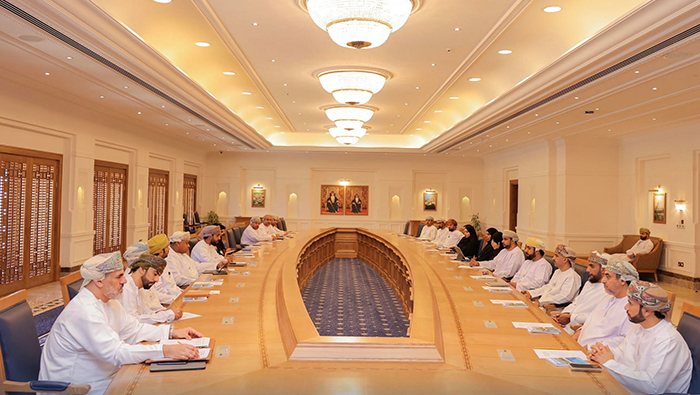
Muscat: The Ministry of Labour aims to regulate the labour market and develop its procedures to provide services to its beneficiaries, including workers, employers, and civil government entities.
It also strives to offer employment services and human resource development services to the public. The Ministry constantly monitors the interactions of the private sector, economic indicators, and the diverse skill requirements of the labour market.
The Ministry makes significant efforts to promote a culture of both private and public sector institutions and their employees in various domains.
It collaborates with social partners, such as the Oman Chamber of Commerce and Industry and the General Federation of Oman Workers, in its endeavours.
Moreover, the Ministry identifies violations through various inspection teams under the Directorate General of Labour Welfare. It closely monitors the different phenomena that arise in the labour market, as well as the violations that occur across diverse economic sectors and establishments of varying sizes.
This is done to ensure the attainment of decent work and uphold labour standards.
Regarding the wages protection system (WPS), Sheikh Mohammed bin Ghaleb Al Hinai, Chairman of the Main Committee for the Completion, Operation, and Development of the Wages Protection System, said: “The Ministry of Labour, in collaboration with the Central Bank of Oman, has been actively involved in developing WPS since 2017, up to its most recent version.
The system’s development has encompassed various aspects to ensure smooth transactions and the confidentiality of information entered by all stakeholders, including both private sector establishments and their employees.
Al Hinai also spoke about the establishment of an executive committee whose mission is to finalise the construction and development of WPS.
Formed in March 2022, the committee consists of members from the Ministry of Labour, as well as representatives from external entities, including the Ministry of Transport, Communications and Information Technology, the Central Bank of Oman, the Oman Chamber of Commerce and Industry, the General Federation of Oman Workers, and the Public Authority for Social Insurance.
The team has conducted a comprehensive analysis of the project, studied the regulatory decisions of the labour law, assessed the Ministry’s organisational structure, and examined the technical aspects and integration of the system with various ministry services.
Al Hinai added, “The team has also developed the technical and administrative work plan and established a timeline for project completion. The administrative plan encompasses a communication and media strategy, as well as a plan to enhance the knowledge of Ministry of Labour employees regarding WPS.”
The Ministry conducted workshops lasting for 22 days, held in all governorates of the Sultanate of Oman, with a specific focus on engaging over 400 male and female employees.
Al Hinai pointed out the plan devised by the Ministry of Labour in collaboration with the Oman Chamber of Commerce and Industry to enhance private sector establishments’ knowledge of the importance of WPS.
The plan, scheduled to run for a period of three months starting in mid-July, will employ various communication channels, including direct and indirect visual mediums, screens, and diverse advertising billboards.
Communication is underway with facilitators of these campaigns, including government entities overseeing specific economic sectors such as the Ministry of Health, Ministry of Education, Ministry of Higher Education, Research, and Innovation, Ministry of Energy and Minerals, Oman Investment Authority, Ministry of Regional Municipalities and Water Resources, Public Authority for Small and Medium Enterprises Development, as well as various associations, including the Oman Energy Association (OPAL).
Al Hinai went on to elaborate on the development of a plan, in collaboration with the General Federation of Oman Workers, aimed at enhancing workers’ awareness. As part of this initiative, workshops will be implemented to introduce workers to the system and emphasise its importance in ensuring workplace stability. Additionally, workers will be educated about their rights and responsibilities concerning the system.
Al Hinai revealed that the Ministry of Labour has been in contact with the Public Authority for Small and Medium Enterprises Development, which is responsible for overseeing Sanad Offices.
The purpose of this communication is to ensure that these offices are fully prepared to deliver their services efficiently and with a high level of professionalism to private sector establishments and beneficiaries of the Ministry of Labour’s services when the Ministry announces the mandatory implementation according to the regulations outlined in Article (53) of the Labour Law.
To enhance the knowledge of employees at Sanad Offices, the Ministry organised workshops through virtual communication on the 21st and 22nd of June. These workshops, consisting of two sessions per day, reached a total of 892 offices across the governorates of the Sultanate of Oman. Furthermore, workshops will be organized to enhance the knowledge of entrepreneurs and small and medium enterprises about the system as part of the private sector orientation workshops.
Regulations for Article (53) of the legal framework
The regulations for Legal Article (53), expected to be issued in July of this year, will cover the uniform format of the Salary Information File, administrative penalties that will be imposed in case of non-compliance with the directive, and other regulatory matters that will be announced upon its release.
The successful implementation of this system requires cooperation among the three parties involved in production, the participating entities, continuous communication between them, ongoing monitoring, proactive measures to address anticipated phenomena, and facilitation of processes to mitigate any negative consequences that may arise.